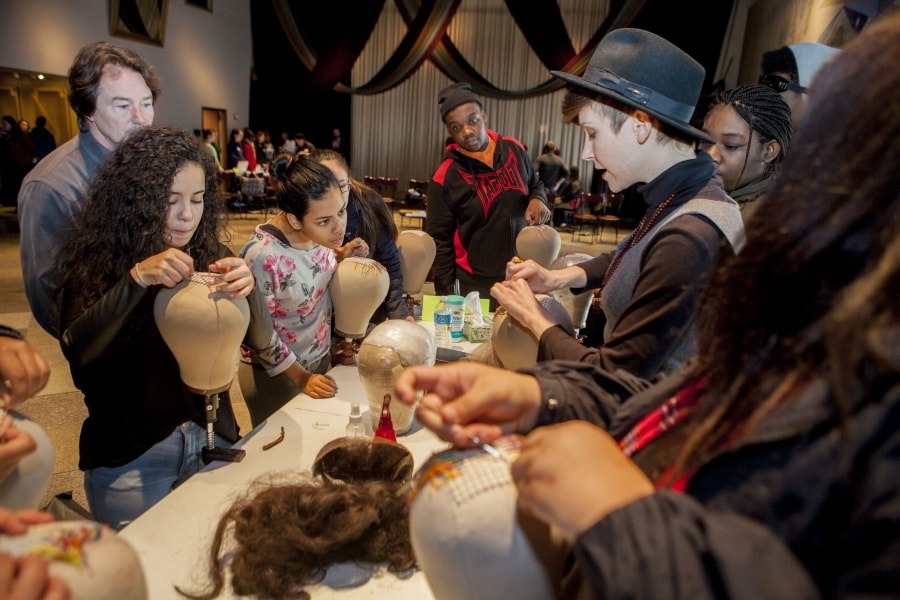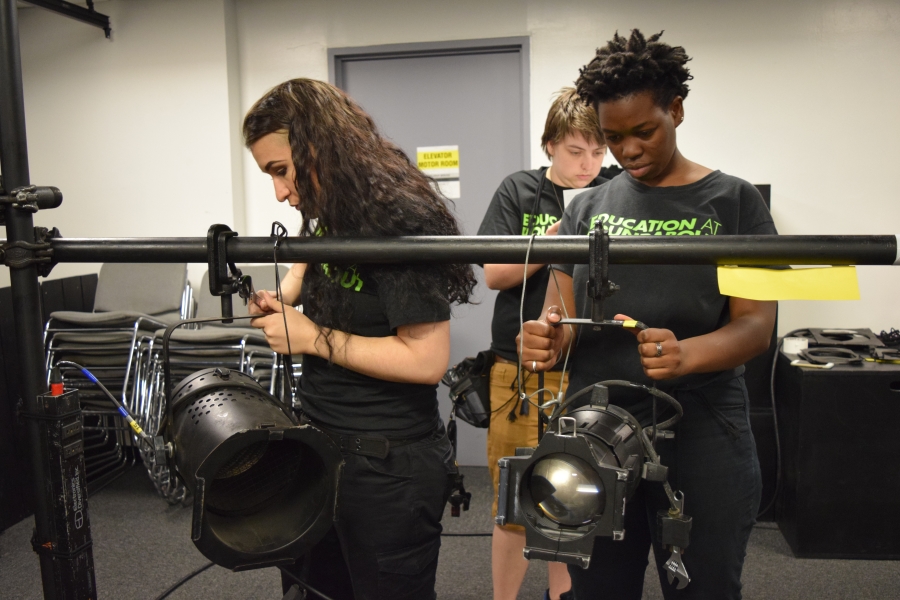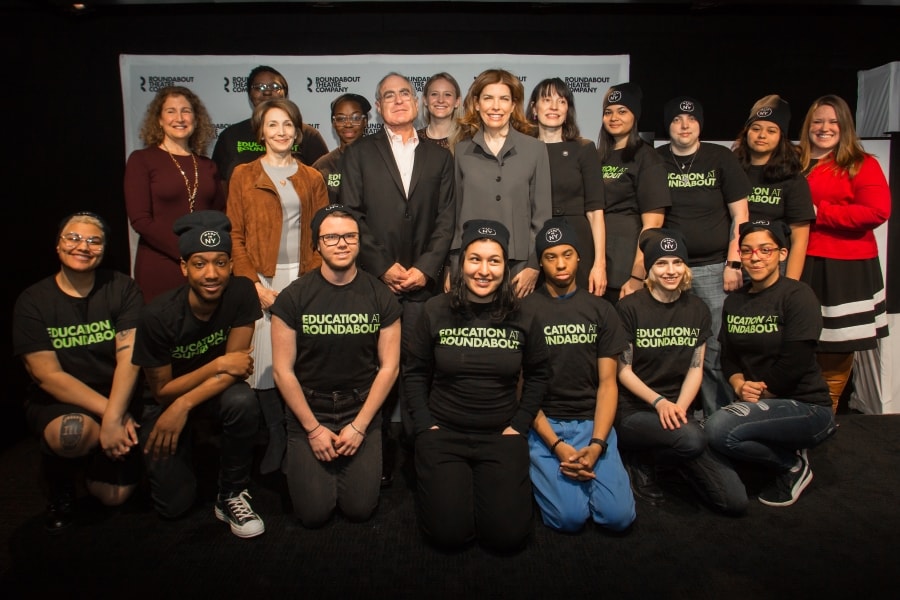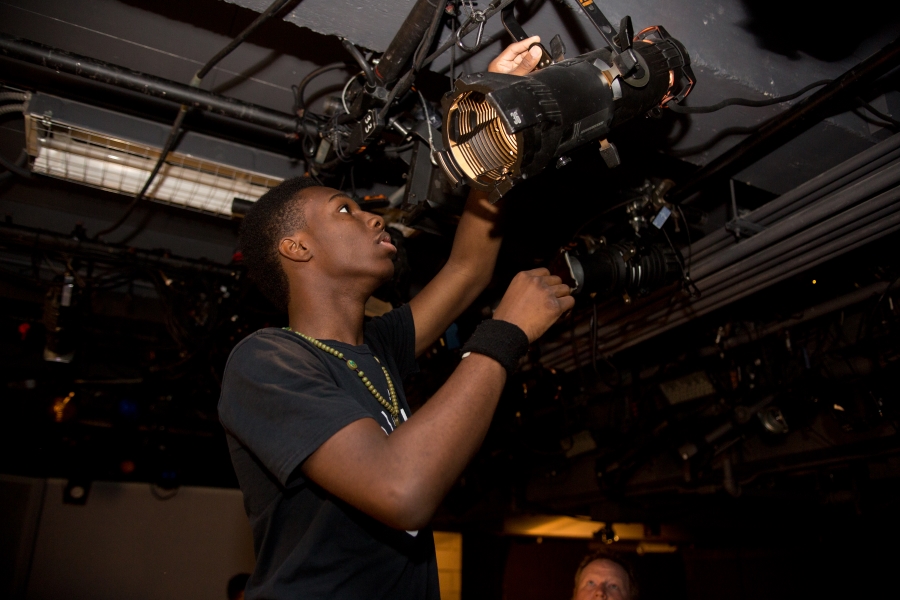Roundabout Theatre Company has been giving New York City public school students a taste of theatre for the past 20 years, with education initiatives that train public school faculty to teach theatre skills in the classroom, offer theatre tickets to school groups, and bring Roundabout teaching artists to all five boroughs to share lessons about different theatrical disciplines. But many students who got a glimpse backstage wanted to know more, and Roundabout recognized this as a missed opportunity to provide a pathway for interested students to build professional careers.
“What we were seeing was that our students in the after-school programs and in the schools were really getting turned on to these careers, but there wasn’t a direct pathway for them to enter the field,” says Jennifer DiBella, Roundabout’s director of education. “There are lots of pathways to enter performance careers but less for the tech world.”
To help bridge this divide, Roundabout partnered with the International Alliance of Theatrical Stage Employees (IATSE) in 2010 to create the “Hidden Career Path Day” program, offering students an opportunity to explore career paths in technical theatre. The series of six field trips give students a glimpse to the work that happens backstage.

What they learn can be eye-opening. While high school students working backstage on student productions likely wear many hats—students doing costumes for a school play are likely designing, building, and shopping for all the costumes, as well as serving as the wardrobe crew. But each of these roles is an individual job in the professional theatre industry, explains DiBella. “The Hidden Career Path Day program created with IATSE puts a spotlight on and highlights those different nuanced career paths.”
The workshop program then led to Roundabout unveiling a training intensive, the Theatrical Workforce Development Program (TWDP), in 2015. The three-year training program, now in its second cohort, provides an alternative pathway to a career for students. It is open to young adults 18-24 living in New York City with a high school degree from a NYC public school or a GED.
The program offers fellows a living wage and reimbursed travel, as well as one-on-one mentorship with a IATSE professional and access to support services. The first year focuses on training and observing electricians, sound engineers, makeup artists, wardrobe workers, carpenters, and stagehands. Fellows are placed in a summer internship, then an entry level job in their chosen discipline at a nonprofit theatre. The fellows continue to receive training and support as they enter their third year with contract work.
For Adrian Green, who started TWDP in September with 19 others, the program provided the perfect next step. “I was looking into college but I wasn’t sure what college would be like, and I wasn’t sure if it was for me,” says Green. “But I knew I wanted to do something within theatre or the entertainment industry.”
Green caught the backstage bug after his high school, a participating school with Education at Roundabout, performed in RTC’s Student Theatre Arts Festival. He participated in RTC’s student-run Youth Ensemble for two summers, as part of the lighting crew and then serving as the movement director.
Before students sign on to the Workforce Development Program, Roundabout requires interested applicants to attend an intensive information session about the program. Applicants are then interviewed by Roundabout staff and members of the unions.
“We try to really be very clear about what kind of work this is,” says DiBella. “This is nontraditional work hours, you’re working nights and weekends—this is not your normal 9-to-5 job.”
Green says the long days, which can sometimes stretch until 9 p.m., are always exciting and varied. “In this program, we don’t do ‘the normal,’” he says. “It’s more than learning about how to hang a light or learning about color fixtures—you’re having fun and getting paid to do something that you want to do.”

Green recently decided that his primary focus would be audio, and his secondary concentration lighting. He concedes that learning how to mix consoles and operate the ETC ion board (a control console for lighting) have been some of the most challenging lessons so far, but the instructors “break it down to a point where it is digestible.”
The hands-on learning extends outside the classroom. The cohort recently toured the Public Theater, and trekked to the St. George Theater on Staten Island to help build sets.
In addition to the long days of workshops, work calls, and lessons, the program also gives the participants opportunities to see shows and attend special events. The group’s most recent outing was to the Museum of Modern Art to see a special screening of the film “Black Panther.” Other excursions have included a matinee performance of John Lithgow’s Stories of the Heart and a backstage tour of RTC’s Time and the Conways at the American Airlines Theatre.
For Green, these shows are more than entertainment—he now watches everything through a design lens, and can see the direct link of what is taught in the program to what is implemented onstage.
And while the cohort is focused on building technical skills, the group is also learning how to craft resumes and cover letters. The fellows work with a representative from the Door, a social service agency that empowers young people to gain the tools to be successful. The representative acts as a sort of case manager, counselor, and career coach all rolled into one, aiding the cohort in everything from housing support to legal aid.
The work-readiness skills are put to the test through meetings with hiring managers, production managers, and completing work calls with participating theatres.

And how is the program working? Pretty well, apparently: In December, Roundabout announced 100 percent job placement for the first TWDP cohort. The 12 fellows are contracted working in carpentry, prop construction, sound design, and more at institutions and shops throughout New York City.
“This job puts you in the freelance market, in a place where you can get paid,” says Green.“It’s fulfilling to know that.”
“We are super thrilled with our first cohort, and they are doing so well working out in the field,” says DiBella. “We’re really excited about our second cohort, who are right now training and getting their feet wet with work opportunities, and we’re excited about continuing to expand our employment partners. We’re always looking for new theatres, shops, or vendors who might be looking for excited young technicians who are qualified and ready to work and excited about this particular career path.”
Green and the second cohort are currently working on perfecting quick changes and building scenery flats. In March, the cohort will travel as a group to the 2018 USITT Conference in Fort Lauderdale, Fla.
“I’m focused on the program and I’m really enjoying myself here. This is a once-in-a-lifetime opportunity for me.”
Roundabout is accepting applications for the TWDP third cohort through June 4.


